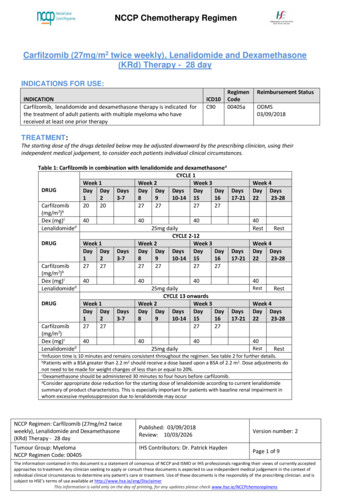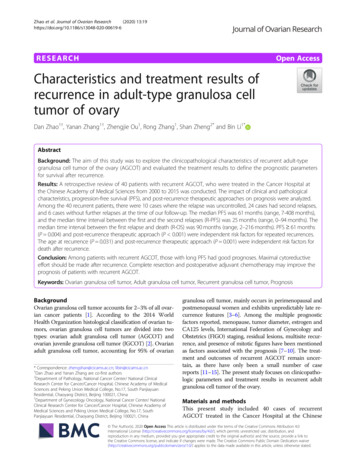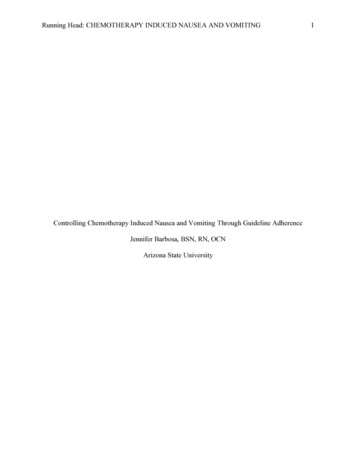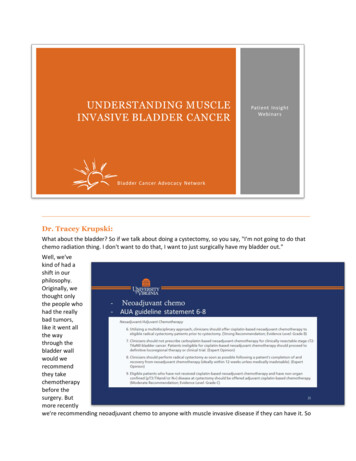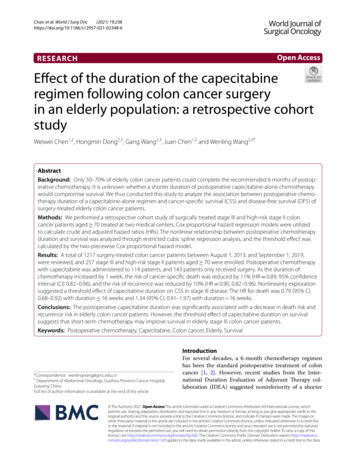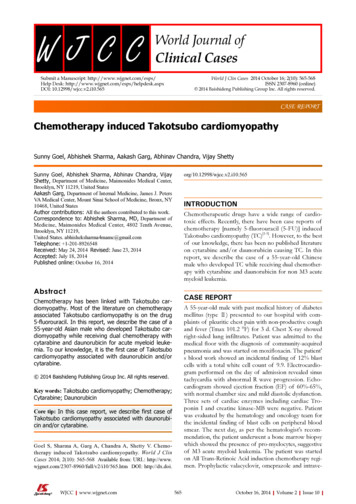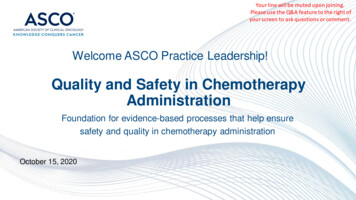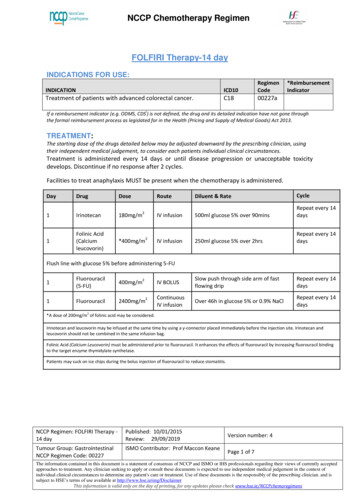
Transcription
NCCP Chemotherapy RegimenFOLFIRI Therapy-14 dayINDICATIONS FOR USE:INDICATIONICD10RegimenCodeTreatment of patients with advanced colorectal cancer.C1800227a*ReimbursementIndicatoriIf a reimbursement indicator (e.g. ODMS, CDS ) is not defined, the drug and its detailed indication have not gone throughthe formal reimbursement process as legislated for in the Health (Pricing and Supply of Medical Goods) Act 2013.TREATMENT:The starting dose of the drugs detailed below may be adjusted downward by the prescribing clinician, usingtheir independent medical judgement, to consider each patients individual clinical circumstances.Treatment is administered every 14 days or until disease progression or unacceptable toxicitydevelops. Discontinue if no response after 2 cycles.Facilities to treat anaphylaxis MUST be present when the chemotherapy is administered.DayDrugDose1Irinotecan180mg/m1Folinic Acid(Calciumleucovorin)*400mg/m22RouteDiluent & RateCycleIV infusion500ml glucose 5% over 90minsRepeat every 14daysIV infusion250ml glucose 5% over 2hrsRepeat every 14daysIV BOLUSSlow push through side arm of fastflowing dripRepeat every 14daysContinuousIV infusionOver 46h in glucose 5% or 0.9% NaClRepeat every 14daysFlush line with glucose 5% before administering m22*A dose of 200mg/m2 of folinic acid may be considered.Irinotecan and leucovorin may be infused at the same time by using a y-connector placed immediately before the injection site. Irinotecan andleucovorin should not be combined in the same infusion bag.Folinic Acid (Calcium Leucovorin) must be administered prior to fluorouracil. It enhances the effects of fluorouracil by increasing fluorouracil bindingto the target enzyme thymidylate synthetase.Patients may suck on ice chips during the bolus injection of fluorouracil to reduce stomatitis.NCCP Regimen: FOLFIRI Therapy 14 dayPublished: 10/01/2015Review: 29/09/2019Tumour Group: GastrointestinalNCCP Regimen Code: 00227ISMO Contributor: Prof Maccon KeaneVersion number: 4Page 1 of 7The information contained in this document is a statement of consensus of NCCP and ISMO or IHS professionals regarding their views of currently acceptedapproaches to treatment. Any clinician seeking to apply or consult these documents is expected to use independent medical judgement in the context ofindividual clinical circumstances to determine any patient's care or treatment. Use of these documents is the responsibly of the prescribing clinician. and issubject to HSE’s terms of use available at http://www.hse.ie/eng/DisclaimerThis information is valid only on the day of printing, for any updates please check www.hse.ie/NCCPchemoregimens
NCCP Chemotherapy RegimenELIGIBILTY: Indications as aboveECOG 0-2Adequate haematological, renal and liver status.CAUTION:Use with caution in patients with Previous pelvic radiotherapy. Recent MI. Uncontrolled angina, hypertension, cardiac arrhythmias, CHF. In patients with baseline greater than 3 loose bowel movements (BM) per day (inpatients without colostomy or ileostomy).EXCLUSIONS: Hypersensitivity to irinotecan or any of the excipients.Baseline neutrophils 2 x 109/L and/or platelet count 100 x 109/L.Severe renal impairment (creatinine clearance 30ml/min).Bilirubin 3 x ULN.Chronic bowel disease and/or bowel obstruction.Pregnancy and lactation.Severe bone marrow failure.Impaired renal function.PRESCRIPTIVE AUTHORITY:The treatment plan must be initiated by a Consultant Medical Oncologist.TESTS:Baseline tests: Blood, liver and renal profile ECG (if patient has compromised cardiac function).Regular tests: Blood, liver and renal profile prior to each cycle INR tests if patient is on warfarin as clinically indicated.Disease monitoring:Disease monitoring should be in line with the patient’s treatment plan and any other test/sas directed by the supervising Consultant.NCCP Regimen: FOLFIRI Therapy 14 dayPublished: 10/01/2015Review: 29/09/2019Tumour Group: GastrointestinalNCCP Regimen Code: 00227ISMO Contributor: Prof Maccon KeaneVersion number: 4Page 2 of 7The information contained in this document is a statement of consensus of NCCP and ISMO or IHS professionals regarding their views of currently acceptedapproaches to treatment. Any clinician seeking to apply or consult these documents is expected to use independent medical judgement in the context ofindividual clinical circumstances to determine any patient's care or treatment. Use of these documents is the responsibly of the prescribing clinician. and issubject to HSE’s terms of use available at http://www.hse.ie/eng/DisclaimerThis information is valid only on the day of printing, for any updates please check www.hse.ie/NCCPchemoregimens
NCCP Chemotherapy RegimenDOSE MODIFICATIONS: Any dose modification should be discussed with a ConsultantIrinotecan should be administered after appropriate recovery of all adverse events tograde 0 or 1 NCI-CTC grading and when treatment-related diarrhoea is fully resolved.At the start of a subsequent infusion of therapy, the dose of irinotecan and fluorouracil,should be decreased according to the worst grade of adverse events observed in theprior infusion.Treatment should be delayed by 1 to 2 weeks to allow recovery from treatment-relatedadverse events.The following dose reductions should be used when calculating FOLFIRI dose reductions forpatients with toxicitiesTable 1: Dose Reduction Levels for All ToxicitiesDose Level 0Dose Level -12Dose Level -222Irinotecan180 mg/m150 mg/m120 mg/m222Folinic Acid (Calcium400 mg/m400 mg/m400 mg/mLeucovorin)222Fluorouracil bolus400 mg/m320 mg/m260 mg/m222Fluorouracil infusion2400 mg/m1900 mg/m1500mg/mNote: Folinic acid is delayed or omitted if bolus fluorouracil is delayed or omittedTable 2:Dose Modifications for Haematological ToxicityToxicityPrior to a Cycle (DAY 1)GradeANC9(x 10 /L)1 1.5 If ANC 1.5 on Day 1 of cycle, holdtreatment, weekly FBC, maximum21.0-1.49of 2 weeks ANC 1.5 within 2 weeks, proceed30.5-0.99with treatment at the dose level4 0.5noted across from the lowest ANCGrade4neutropeniaandresult of the delayed week(s).grade 2 fever If ANC remains 1.5 after 4 weeksDose Level -3DiscontinueDiscontinueDiscontinueDiscontinueDose Level for Subsequent CyclesIrinotecanFluorouracilMaintain doselevelMaintain doselevel 1 dose level 2 dose levels 2 dose levelsMaintain dose levelIrinotecanFluorouracilMaintain dose levelMaintain dose level 1 dose level 2 dose levels 2 dose levelsdiscontinue treatmentGrade If platelets 75 on Day 1 of cycle,hold treatment, weekly FBC,maximum of 2 weeks Platelets 75 within 2 weeks,proceed with treatment at thedose level noted across from thelowest platelets result of thedelayed week(s). If platelets remains 75 after 2weeks, discontinue treatment1Platelets9(x10 /L) 75250-74.9310-49.9Maintain doselevelMaintain doselevel 1 dose level 10 2 dose levels 4Maintain dose level 1 dose level 2 dose levelsThe use of granulocyte colony-stimulating factor (G-CSF) may be considered.NCCP Regimen: FOLFIRI Therapy 14 dayPublished: 10/01/2015Review: 29/09/2019Tumour Group: GastrointestinalNCCP Regimen Code: 00227ISMO Contributor: Prof Maccon KeaneVersion number: 4Page 3 of 7The information contained in this document is a statement of consensus of NCCP and ISMO or IHS professionals regarding their views of currently acceptedapproaches to treatment. Any clinician seeking to apply or consult these documents is expected to use independent medical judgement in the context ofindividual clinical circumstances to determine any patient's care or treatment. Use of these documents is the responsibly of the prescribing clinician. and issubject to HSE’s terms of use available at http://www.hse.ie/eng/DisclaimerThis information is valid only on the day of printing, for any updates please check www.hse.ie/NCCPchemoregimens
NCCP Chemotherapy RegimenRenal and Hepatic Impairment:Table 3: Recommended dose modification for 5-FU in patients with renal or hepatic impairmentDrugRenal impairmentHepatic impairmentIrinotecanNo dose reduction needed,Irinotecan is contraindicated in patients with bilirubinhowever use with caution as nolevels 3 x ULN.information in this setting.5-FUConsider dose reduction in severerenal impairment onlyBilirubin(micromol/L)ASTDose 85 180100% 85or 180CIClinical decision.Moderate hepatic impairment; reduce initial dose by 1/3.Severe hepatic impairment, reduceinitial dose by 1/2.Increase dose if no toxicityManagement of adverse events:Table 4: Dose modification schedule based on adverse eventsPrior to a Cycle (DAY 1)Grade ofDose Level for Subsequent ain dose level Maintain dose level Grade 2, hold treatment max 1 and 2of 2 weeks Grade 2 within 2 weeks3 1 dose level 1 dose levelproceed with treatment at thedose level noted across fromthe highest grade experienced4 2 dose levels 2 dose levels Remains Grade 2 after 2weeks, discontinue treatmentStomatitisMaintain dose level Maintain dose level Grade 2, hold treatment max 1 and 2of 2 weeks Grade 2 within 2 weeksproceed with treatment at the3Maintain dose level 1 dose leveldose level noted across fromthe highest grade experienced. Remains Grade 2 after 24Maintain dose level 2 dose levelsweeks, discontinue treatmentSUPPORTIVE CARE:EMETOGENIC POTENTIAL: Moderate (Refer to local policy).PREMEDICATIONS:Prophylactic atropine sulphate 250micrograms subcutaneously – see adverse effects below.Atropine should not be used in patients with glaucoma. (See Adverse Effects/Regimen specificcomplications below).NCCP Regimen: FOLFIRI Therapy 14 dayPublished: 10/01/2015Review: 29/09/2019Tumour Group: GastrointestinalNCCP Regimen Code: 00227ISMO Contributor: Prof Maccon KeaneVersion number: 4Page 4 of 7The information contained in this document is a statement of consensus of NCCP and ISMO or IHS professionals regarding their views of currently acceptedapproaches to treatment. Any clinician seeking to apply or consult these documents is expected to use independent medical judgement in the context ofindividual clinical circumstances to determine any patient's care or treatment. Use of these documents is the responsibly of the prescribing clinician. and issubject to HSE’s terms of use available at http://www.hse.ie/eng/DisclaimerThis information is valid only on the day of printing, for any updates please check www.hse.ie/NCCPchemoregimens
NCCP Chemotherapy RegimenOTHER SUPPORTIVE CARE:Oral pyridoxine 50mg three times a day when required for the relief of palmar- plantarerythrodysesthesia.Anti-diarrhoeal treatment (Refer to local policy).Patients should be made aware of the risk of delayed diarrhoea occurring more than 24 hours afterthe administration of irinotecan and at any time before the next cycle. As soon as the first liquid stool occurs, the patient should start drinking large volumes ofbeverages containing electrolytes and an appropriate anti-diarrhoeal therapy must be initiatedimmediately. The currently recommended anti-diarrhoeal treatment consists of high doses of loperamide (4mg for the first intake and then 2 mg every 2 hours). This therapy should continue for 12 hours after the last liquid stool and should not bemodified. In no instance should loperamide be administered for more than 48 consecutive hours atthese doses, because of the risk of paralytic ileus, nor for less than 12 hours.Patients should be warned about the potential for dizziness or visual disturbances which may occurwithin 24 hours following the administration of irinotecan, and advised not to drive or operatemachinery if these symptoms occur.ADVERSE EFFECTS / REGIMEN SPECIFIC COMPLICATIONSThe adverse effects listed are not exhaustive. Please refer to the relevant Summary of Product Characteristics forfull details. Acute cholinergic syndrome: If acute cholinergic syndrome appears (defined as earlydiarrhoea and various other symptoms such as sweating, abdominal cramping, lacrimation,myosis and salivation) atropine sulphate (250 micrograms subcutaneously) should beadministered unless clinically contraindicated. Caution should be exercised in patients withasthma. In patients who experienced an acute and severe cholinergic syndrome, the use ofprophylactic atropine sulphate is recommended with subsequent doses of irinotecan.Diarrhoea - Irinotecan induced diarrhoea can be life threatening and requires immediatemanagement.o Diarrhoea (early onset) - see acute cholinergic syndrome above.o Diarrhoea (late onset):o Irinotecan induced diarrhoea can be life threatening and requires immediatemanagement.o In monotherapy, the median time of onset of the first liquid stool was on day 5 afterthe infusion of irinotecan.o Patients with an increased risk of diarrhoea are those who had previousabdominal/pelvic radiotherapy, those with baseline hyperleucocytosis, those withperformance status 2 and women.o In patients who experience severe diarrhoea, a reduction in dose is recommended forsubsequent cycles.o The SmPC (9) provides guidelines on when hospitalisation for the management ofdiarrhoea is recommended.Neutropenia: Fever or other evidence of infection must be assessed promptly and treatedappropriately.Extravasation: Irinotecan causes pain and tissue necrosis if extravasated. (Refer to localNCCP Regimen: FOLFIRI Therapy 14 dayPublished: 10/01/2015Review: 29/09/2019Tumour Group: GastrointestinalNCCP Regimen Code: 00227ISMO Contributor: Prof Maccon KeaneVersion number: 4Page 5 of 7The information contained in this document is a statement of consensus of NCCP and ISMO or IHS professionals regarding their views of currently acceptedapproaches to treatment. Any clinician seeking to apply or consult these documents is expected to use independent medical judgement in the context ofindividual clinical circumstances to determine any patient's care or treatment. Use of these documents is the responsibly of the prescribing clinician. and issubject to HSE’s terms of use available at http://www.hse.ie/eng/DisclaimerThis information is valid only on the day of printing, for any updates please check www.hse.ie/NCCPchemoregimens
NCCP Chemotherapy Regimen extravasation guidelines).Gilbert’s Syndrome: Increases the risk of irinotecan-induced toxicity. A reduced initial doseshould be considered for these patients.Respiratory disorders: Severe pulmonary toxicity has been reported rarely. Patients with riskfactors should be monitored for respiratory symptoms before and during irinotecan therapy.Myocardial ischaemia and angina: Cardiotoxicity is a serious complication during treatmentwith fluorouracil. Patients, especially those with a prior history of cardiac disease or other riskfactors, treated with fluorouracil, should be carefully monitored during therapy.Dihydropyrimidine dehydrogenase (DPD) deficiency: Rare, life-threatening toxicities such asstomatitis, mucositis, neutropenia, neurotoxicity and diarrhoea have been reported followingadministration of fluoropyrimidines (e.g. fluorouracil and capecitabine). Severe unexplainedtoxicities require investigation prior to continuing with treatment.Palmar Plantar Erythrodysesthesia (PPE): This has been reported as an unusual complicationof high dose bolus or protracted continuous therapy with fluorouracil.DRUG INTERACTIONS: Risk of drug interactions causing decreased concentrations of irinotecan with CYP3A inducers. Risk of drug interactions causing increased concentrations of irinotecan with CYP3A inhibitors.Patients should also be counselled with regard to consumption of grapefruit juice. Prochlorperazine should be avoided on the same day as irinotecan treatment due to theincreased incidence of akathisia. Marked elevations of prothrombin time and INR have been reported in patients stabilized onwarfarin therapy following initiation of fluorouracil regimes. Concurrent administration of fluorouracil and phenytoin may result in increased serum levelsof phenytoin. Caution should be taken when using fluorouracil in conjunction with medications which mayaffect dihydroprimidine dehydrogenase activity. Current drug interaction databases should be consulted for more information.ATC CODE:Irinotecan5-FluorouracilFolinic acid-L01XX19L01BC02V03AF03REFERENCES:1. André T, Boni C et al. Oxaliplatin, Fluorouracil, and Leucovorin as Adjuvant Treatment forColon Cancer. N Engl J Med 2004;350:2343-23512. Tournigand C, André T et al. FOLFIRI followed by FOLFOX6 or the reverse Sequence inAdvanced Colorectal Cancer: A Randomized GERCOR Study. J Clin Oncol 2004; Vol 22 No.2:229-237.3. Douillard JY et al. Irinotecan combined with fluorouracil compared with fluorouracil alone asfirst line treatment for metastatic colorectal cancer: a multicentre randomised trial. Lancet.2000;355:1041-1047.4. Andre T et al. CPT-11 (irinotecan) addition to bimonthly, high dose leucovorin and bolus andcontinuous-infusion 5-fluorouracil (FOLFIRI) for pretreated metastatic colorectal cancer.GERCOR. Eur J Cancer. 1999;35(9):1343-7.NCCP Regimen: FOLFIRI Therapy 14 dayPublished: 10/01/2015Review: 29/09/2019Tumour Group: GastrointestinalNCCP Regimen Code: 00227ISMO Contributor: Prof Maccon KeaneVersion number: 4Page 6 of 7The information contained in this document is a statement of consensus of NCCP and ISMO or IHS professionals regarding their views of currently acceptedapproaches to treatment. Any clinician seeking to apply or consult these documents is expected to use independent medical judgement in the context ofindividual clinical circumstances to determine any patient's care or treatment. Use of these documents is the responsibly of the prescribing clinician. and issubject to HSE’s terms of use available at http://www.hse.ie/eng/DisclaimerThis information is valid only on the day of printing, for any updates please check www.hse.ie/NCCPchemoregimens
NCCP Chemotherapy Regimen5. Tournigand C, André T et al. FOLFIRI followed by FOLFOX6 or the reverse sequence inadvanced colorectal cancer: a randomized GERCOR study. J Clin Oncol 2004; 22(2): 229-37.6. BCCA Protocol Summary for Palliative Combination Chemotherapy for Metastatic ColorectalCancer Using Irinotecan, Fluorouracil and Leucovorin GIFOLFIRI7. Dosage Adjustment for Cytotoxics in Renal Impairment January 2009; North London CancerNetwork. Available at nt-dosageadjustment-for-cytotoxics.pdf8. Dosage Adjustment for Cytotoxics in Hepatic Impairment January 2009; North London CancerNetwork . Available at ment-dosageadjustment-for-cytotoxics.pdf9. CAMPTO Summary of Product Characteristics. Accessed Sept 2017 Available icenseSPC PA0019-053003 16012012170041.pdf10. Fluorouracil. Summary of Product Characteristics Accessed Sept 2017. ocuments/LicenseSPC PA0437-011001 07102013125206.pdfVersion 27/09/2017AmendmentInitial draftInfusor table updateReviewedUpdated with new NCCP template,updated dose reductions for alltoxicities and dosing in renal andhepatic impairmentApproved ByProf Maccon KeaneProf Maccon KeaneProf Maccon KeaneProf Maccon KeaneComments and feedback welcome at oncologydrugs@cancercontrol.ie.iODMS – Oncology Drug Management SystemCDS – Community Drug Schemes (CDS) including the High Tech arrangements of the PCRS communitydrug schemesFurther details on the Cancer Drug Management Programme is available ofinfo/medonc/cdmp/NCCP Regimen: FOLFIRI Therapy 14 dayPublished: 10/01/2015Review: 29/09/2019Tumour Group: GastrointestinalNCCP Regimen Code: 00227ISMO Contributor: Prof Maccon KeaneVersion number: 4Page 7 of 7The information contained in this document is a statement of consensus of NCCP and ISMO or IHS professionals regarding their views of currently acceptedapproaches to treatment. Any clinician seeking to apply or consult these documents is expected to use independent medical judgement in the context ofindividual clinical circumstances to determine any patient's care or treatment. Use of these documents is the responsibly of the prescribing clinician. and issubject to HSE’s terms of use available at http://www.hse.ie/eng/DisclaimerThis information is valid only on the day of printing, for any updates please check www.hse.ie/NCCPchemoregimens
NCCP Chemotherapy Regimen NCCP Regimen: FOLFIRI Therapy - 14 day Published: 10/01/2015 Review: 29/09/2019 Version number: 4 Tumour Group: Gastrointestinal NCCP Regimen Code: 00227 ISMO Contributor: Prof Maccon Keane Page 1 of 7 The information contained in this document is a statement of consensus of NCCP and ISMO or IHS professionals regarding .

